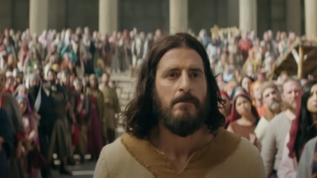Political observers say “that half the Christians in America aren’t even registered to vote, and of those who are, only half go to the polls” and that “it would be safe to say that less than half of all professing Christians vote in a given election.” Therefore, with 2004 being one of the most critical election years in the nation, Christians on both conservative and liberal wings are rallying adherents to get out the vote and choose the candidates who most closely represent their ‘values’ and ‘principles.’
The largest Evangelical conglomerate, the National Association of Evangelicals, last month released an “Evangelical Call to Civil Responsibility,” where conservative Christians were urged to “help shape the actions of the world’s lone superpower.”
"This statement supports thoughtful and sustained evangelical engagement in political life,” said Dianne Knippers, president of the Institute on Religion and Democracy. “We want to encourage evangelical citizens to be involved in political parties and activities, including an unabashed advocacy of biblical principles and positions."
Similarly, the largest evangelical denomination, the 16-million member strong Southern Baptist Convention, officially launched their ivotevalues.com website, where churches can order voter-registration tool kits for whole congregations. The message in ivotevalues is also clear: uphold your values in your nation by electing your candidate.
Neither the NAE nor the SBC encourages its members to vote for any one political party. However, the born-again Methodist George W. Bush garnered an overwhelming support from the evangelical base for his conservative views on critical issues such as homosexual “marriage,” terrorism and abortion.
Meanwhile, on the left wing, the National Council of Churches USA released 10 principles for evaluating candidates for presidency on July 15, 2004, entitled, “Christian Principles in an Election Year.” The statement lists “well-established ecumenical principles” on issues such as war, poverty, immigration, education, health care, racial justice, distress in U.S. inner cities and rural communities, the environment and criminal justice system, but does not list issues that evangelicals consider “hot”.
“The principles are not intended to be partisan, but rather to lift up common principles that have been affirmed ecumenically and that can provide guidance in this election season,” said the Rev. Dr. Michael Kinnamon, who chairs the NCC's Justice and Advocacy Commission. “There are other issues on which some Justice and Advocacy Commission members wanted to speak and that Roman Catholics and conservative evangelical Christians might add, but on which churches aren't united – among them, abortion and gay marriage.”
While the evangelical NAE and the ecumenical NCC stand at odds on those critical issues, they agree at least on one position: Christians must engage themselves in civic society.
The NAE’s Statement begins with the Preamble:
“Evangelical Christians in America Face a historic opportunity. We make up fully one quarter of all voters in the most powerful nation in history. Never before has God given American evangelicals such an awesome opportunity to shape public policy in ways that could improve the well being of the entire world. Disengagement is not an option. We must seek God’s face for biblical faithfulness and abundant wisdom to rise to this unique challenge.”
The NCC’s declaration similarly states:
“Our Christian faith compels us to address the world through the lens of our relationship to God and to one another. Public discourse is enhanced as we engage civic leaders on the values and ethics affirmed by our faith.”
According to the NCC’s General Secretary Rev. Bob Edgar, the NCC believes "elections are an opportunity for education of voters, communities and churches around what civic responsibility is. We believe in the separation of church and state, but not in the separation of people of faith from institutions of government We believe people of faith need to be involved in the political process, be registered, and vote with a sense of empowerment and conscience.”
The following is the list of 10 Christian Principles in an Election Year, as penned by the NCC:
1. War is contrary to the will of God. While the use of violent force may, at times, be a necessity of last resort, Christ pronounces his blessing on the peacemakers. We look for political leaders who will make peace with justice a top priority and who will actively seek nonviolent solutions to conflict.
2. God calls us to live in communities shaped by peace and cooperation. We reject policies that abandon large segments of our inner city and rural populations to hopelessness. We look for political leaders who will re-build our communities and bring an end to the cycles of violence and killing.
3. God created us for each other, and thus our security depends on the well-being of our global neighbors. We look for political leaders for whom a foreign policy based on cooperation and global justice is an urgent concern.
4. God calls us to be advocates for those who are most vulnerable in our society. We look for political leaders who yearn for economic justice and who will seek to reduce the growing disparity between rich and poor.
5. Each human being is created in the image of God and is of infinite worth. We look for political leaders who actively promote racial justice and equal opportunity for everyone.
6. The earth belongs to God and is intrinsically good. We look for political leaders who recognize the earth's goodness, champion environmental justice, and uphold our responsibility to be stewards of God's creation.
7. Christians have a biblical mandate to welcome strangers. We look for political leaders who will pursue fair immigration policies and speak out against xenophobia.
8. Those who follow Christ are called to heal the sick. We look for political leaders who will support adequate, affordable and accessible health care for all.
9. Because of the transforming power of God's grace, all humans are called to be in right relationship with each other. We look for political leaders who seek a restorative, not retributive, approach to the criminal justice system and the individuals within it.
10. Providing enriched learning environments for all of God's children is a moral imperative. We look for political leaders who will advocate for equal educational opportunity and abundant funding for children's services.
For more information on the NAE’s Call to Civic Responsibility, or to view the entire statement, please visit: www.nae.net. For more information on the SBC-led ivotevalues initiative, please visit: www.ivotevalues.net.







